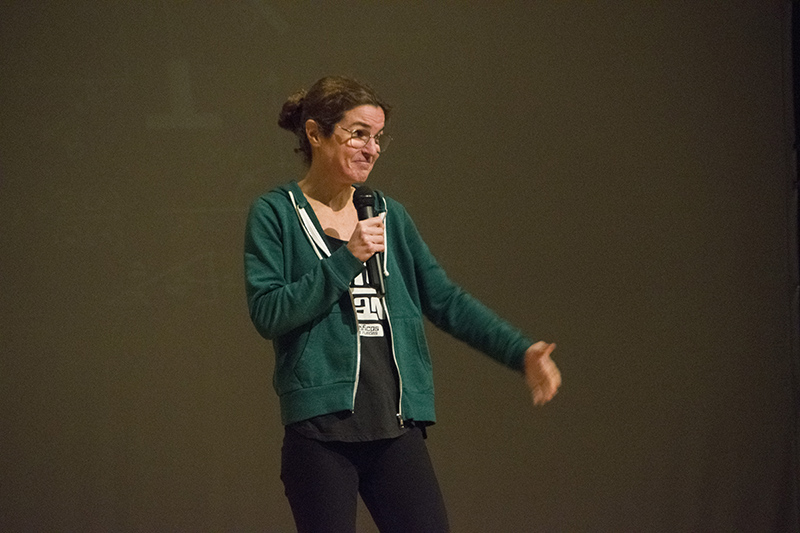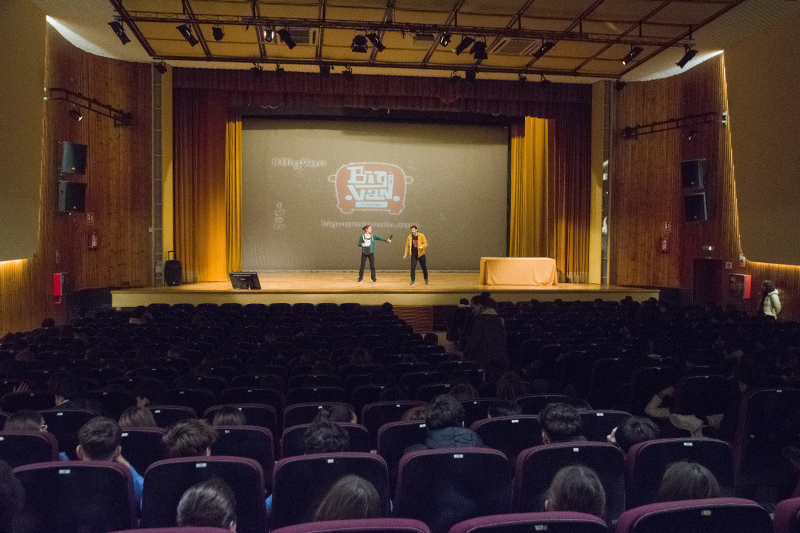This WEB site, for its greater availability and functionality, uses cookies to improve and optimize the user experience. Then, School San Fernando It makes available to the users of its website the detailed information on what the cookies, what typology this website uses, how can you disable them in your browser and how to specifically block the installation of cookies of third parties, as provided by the current regulatory legislation on the subject.
What are cookies?
All the cookies are files that the website or application that will be in use installs in your browser or on your device (smartphone, tablet or connected television) during your tour of the page or by the application, being your main mission store information about your visit. The web of School San Fernando uses cookies to:
- Ensure that web pages can work correctly.
- Store your preferences, such as size and typeface.
- Know your browsing experience.
- Collect anonymous statistical information, such as what sections you have visited, as well as how long you have been in our environment
The use of cookies allows us to optimize your browsing, adapting the information and services offered to your interests, to provide you with a better experience whenever you visit us. The website of School San Fernando uses cookies to operate, adapt and make the user's navigation as easy as possible. The cookies they are associated only with an anonymous user and their computer / device and do not provide references that allow knowing personal data. At any time you can access the configuration of your browser to modify and / or block the installation of the cookies sent by the website of School San Fernando, without impeding access to content. However, the quality of operation of the services may be affected. The cookies, from a technical point of view, allow websites to work more agile and adapted to the preferences of users, for example by storing the language or detecting the access device. They also establish levels of protection and security that prevent or hinder cyber attacks against the website or its users and allow media managers to know statistical data collected to improve the quality and experience of their services.
Types of school cookies San Fernando
- Session sessions expire when the user leaves the page or closes the browser, that is, they are active for the duration of the visit to the website and therefore they are deleted from our computer when they leave it.
- The permanent expire when the objective for which they serve is met or when they are manually deleted. They have a deletion date and are normally used for purchase purposes online, customizations or registration, to avoid having to enter our password constantly.
On the other hand, depending on who is the entity that manages the computer or domain from where the cookies are sent and treat the data obtained, we can distinguish between cookies own and from third parties.
- All the cookies own are those that are sent to your computer and managed exclusively by School San Fernando for the best functioning of the web. The information we collect is used to improve the quality of our service and your experience as a user.
- If you interact with the content of our website you can also establish cookies of third parties (for example, by pressing buttons on social networks or watching videos hosted on another website), which are those established by a domain different from our website. We can not access the data stored in the cookies from other websites when you browse them.
Navigating through this web portal means that you can install the following types of cookies:
1. COOKIES OF PERFORMANCE. This type of cookies remember your preferences for the tools found in the services, so you do not have to reconfigure the service each time you visit. As an example, this typology includes:
- Volume settings of video or sound players
- Video transmission speeds that are compatible with your browser
- Objects stored in the "shopping cart" in the services of E-commerce, such as stores.
2. REGISTRATION COOKIES. The cookies registration are generated once the user has registered or subsequently opened their session, and are used to identify you in the services with the following objectives:
- Keep the user identified so that, if a service, the browser or the computer closes, and at another time or another day he / she returns to enter that service, he / she can continue to be identified, thus facilitating his navigation without having to re-identify himself. This functionality can be suppressed if the user presses the "close session" or "exit" functionality, so that cookie it is deleted and the next time it enters the service the user will have to log in to be identified.
- Check if the user is authorized to access certain services, for example, to participate in a contest or make an enrollment in activities or services organized by the San Ferenando School.
Additionally, some services may use connectors with social networks such as Facebook, Twitter or Linkedin. When the user registers in a service with credentials of a social network, authorizes the social network to save a cookie persistent that remembers your identity and guarantees access to services until it expires. The user can delete this cookie and revoke access to services through social networks by updating their preferences in the social network you specify.
3. COOKIES OF ANALYTICS. Each time a user visits a service, a tool from an external provider (Omniture, Netscope, Comscore and similar) generates a cookie analytics on your computer. This cookie, which is only generated during the visit, will serve in future visits to the services of School San Fernando to identify the visitor anonymously. The main objectives that are pursued are:
- Allow anonymous identification of navigating users through the cookie (identifies browsers and devices, not people) and therefore the approximate count of the number of visitors and their trend over time.
- Identify anonymously the most visited content and therefore more attractive to users.
- Know if the user who is accessing is new or repeat visit.
4. COOKIES ADVERTISING. This type of cookies allows to expand the information of the displayed ads to each anonymous user in the services of School San Fernando, if it exists. Among others, it is stored the duration or frequency of visualization of advertising positions, the interaction with them or the browsing patterns and / or user behaviors, since they help to shape a profile of advertising interest. In this way, they allow to offer advertising related to the interests of the user.
Additionally, School San Fernando uses Google Analytics, a web analytics service provided by Google, Inc., a Delaware company whose main office is at 1600 Amphitheater Parkway, Mountain View (California), CA 94043, United States ("Google"). Google Analytics uses cookies, which are text files located on your computer to help the website analyze the use made by its users. The information generated by cookies about your use of website (including your IP address) will be directly transmitted and archived by Google on servers in the United States. Google will use this information on our behalf in order to keep track of your use of the website, compiling reports on its activity and providing other services related to your activity and the use of the Internet. Google may transmit such information to third parties when required by law, or when such third parties process the information on behalf of Google. Google will not associate your IP address with any other data you have. You can refuse the processing of data or information by refusing to use cookies by selecting the appropriate configuration of your browser.
Disable cookies in the main browsers
It is possible to stop accepting cookies browser, or stop accepting the cookies of a particular service. All browsers allow you to change the configuration of cookies. These settings are usually found in the 'Options' or 'Preferences' menu of your browser. Since School San Fernando We offer the user guidance on the steps to access the configuration menu of the cookies and, where appropriate, private browsing in each of the main browsers:
- Internet Explorer: Tools -> Internet Options -> Privacy -> Settings.
For more information, you can consult Microsoft support or browser Help.
- Firefox: Tools -> Options -> Privacy -> History -> Custom Settings.
For more information, you can check Mozilla support or browser Help.
- Chrome: Settings -> Show advanced options -> Privacy -> Content settings.
For more information, you can check Google support or browser Help.
- Safari: Preferences -> Security.
For more information, you can check Apple support or browser Help. Internet Explorer:
Safari:
http://support.apple.com/kb/PH5042?viewlocale=es_ES http://support.apple.com/kb/HT1677?viewlocale=es_ES
Google:
https://support.google.com/chrome/answer/95647?hl=es&hlrm=en
Firefox:
http://support.mozilla.org/es/kb/cookies-informacion-que-los-sitios-web-guardan-en-?redirectlocale=en-US&redirectslug=Cookies
Android:
http://support.google.com/android/?hl=es
Windows Phone:
http://www.windowsphone.com/es-ES/how-to/wp7/web/changing-privacy-and-other-browser-settings
Blackberry:
http://docs.blackberry.com/en/smartphone_users/deliverables/18578/Turn_off_cookies_in_the_browser_60_1072866_11.jsp In the event of proceeding to the disabling of the cookies, some functionalities of the services will be disabled, as for example, remain identified.
Updates and changes in the privacy policy / cookies
School San Fernando You can modify this policy cookies in accordance with legislative, regulatory requirements or with the purpose of adapting said policy to the instructions issued by the Spanish Agency for Data Protection. Therefore, users are advised to visit it periodically. Significant changes in this policy that may occur will be communicated to users, either through the website itself, or through email, in the case of registered users.






















